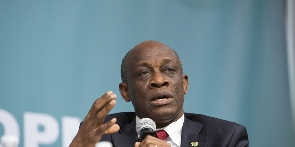- Home - News
- TWI News | TV
- Polls
- Year In Review
- News Archive
- Crime & Punishment
- Politics
- Regional
- Editorial
- Health
- Ghanaians Abroad
- Tabloid
- Africa
- Religion
- Election 2020
- Coronavirus
- News Videos | TV
- Photo Archives
- News Headlines
- Press Release
General News of Saturday, 27 September 2008
Source: GNA
Ghana's eco-tourism sites goes live on Japanese TV
Accra, Sept 27, GNA - Some of Ghana's eco-tourism sites would on Saturday, September 27, 2008, World Tourism Day, be beamed live for the first time from the Kakum National Park Canopy Walkway onto Japanese public television, a statement from the Wildlife Division of the Forestry Commission said.
The statement said the Japanese public broadcaster, Nihon Hoso Kyokai (NHK) otherwise known as the Japan Broadcasting Corporation, had over the past few weeks taken shots of various ecotourism sites in Ghana for a documentary series titled "Around the world with ecotourism", scheduled for telecast between April and December 2008. The sites shot in Ghana included the Makola Market, Kwame Nkrumah Circle and Independence Square Area all in Accra; Cape Coast, Assin Manso, Kakum National Park and its surroundings; the floating village of Nzulezo, Obuasi, the Manhyia Palace, Kejetia Market and its surroundings all in Kumasi.
Other sites include the Kintampo Falls, Boabeng-Fiema Monkey Sanctuary and the community's involvement in fire protection and forest restoration, Tamale and surrounding villages to witness shea butter (nku) making; game viewing in Mole National Park
It said the 50 minutes documentary is aimed at introducing the Japanese public to ecotourism in different parts of the world, with the view to attracting Japanese tourist to those sites. "This documentary series has become very popular in Japan as it portrays a young Japanese accompanied by a local guide who is very knowledgeable in interpreting the beauty of nature including wildlife in relation to sustainable development and conservation of the ecosystem," the statement said. The statement said the Kakum National Park was particularly chosen as the location for the live transmission to highlight how the rain forest protection contributed to reduction in global warming. "The Wildlife Division of the Forestry Commission and other agencies, have effectively collaborated with the hope that this documentary will bring about an increase in Japanese tourists to Ghana in the coming years," it said. The statement said the documentary would be shown to the Ghanaian public at a later date.










